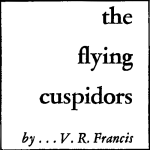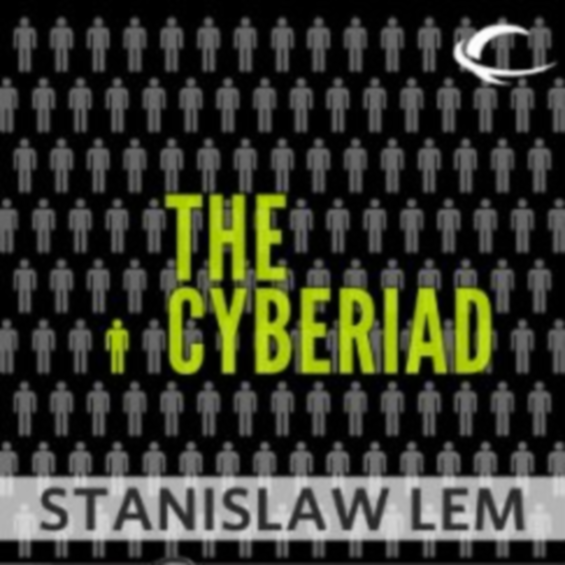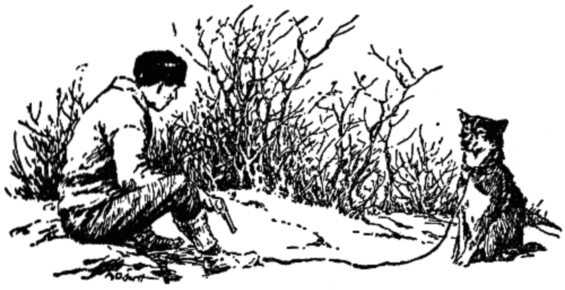
 Maissa Bessada’s The Destiny Of Special Agent Ace Galaksi is very hard to tell you about. It’d be easy to say the show is just bonkers, but that’d give you the idea that it doesn’t work on a certain level that it really does. The plot is nonsensical, in the way that some of Philip K. Dick’s are. But If I said it was like a Philip K. Dick plot that’d give you absolutely the wrong idea. The Destiny Of Special Agent Ace Galaksi is far more like the Goon Show than PKD.
Maissa Bessada’s The Destiny Of Special Agent Ace Galaksi is very hard to tell you about. It’d be easy to say the show is just bonkers, but that’d give you the idea that it doesn’t work on a certain level that it really does. The plot is nonsensical, in the way that some of Philip K. Dick’s are. But If I said it was like a Philip K. Dick plot that’d give you absolutely the wrong idea. The Destiny Of Special Agent Ace Galaksi is far more like the Goon Show than PKD.
The Destiny Of Special Agent Ace Galaksi is naive, sharp, amateurish, polished, bizarre, insightful, childish, wise, ridiculous, and hilarious. I’ve been listening to the six half hour episodes over and over for the last three weeks and I still honestly don’t know exactly what to make of it or how even to really describe it – other than to say I like it a whole lot and I want Maissa Bessada to be my friend.
We may have to look at The Destiny Of Special Agent Ace Galaksi as a kind of work of genius, something to marvel at, something to experience. There’s a kind of damn the torpedoes specificity to the details of this show that make it an impossible project to imagine got made. And yet here it is, like a very weird dream come alive, The Destiny Of Special Agent Ace Galaksi seems to have come from an alternative universe.
But I don’t want to scare you off, it a weird experimental audio drama, in fact it’s pretty conventional, and first and foremost it’s a comedy. So let me invite you in.
Think of the great comedic audio dramas: The Hitchhiker’s Guide To The Galaxy, The Scarifyers, Steve, The First or Dick Dynamo: The Fifth Dimensional Man.
You’d say yeah, it’s a comedy like those. But then I’d say to you that, unlike Hitchhiker’s, this one’s really zany! Zany on multiple levels. And that, unlike Scarifyers, this one’s a Science Fiction comedy, that it’s really not very much interested in how things are, as much as how they could be! There’s no periodicity to it. And that, unlike Steve, this one, though totally and utterly Canadian, is full of international flavouring! And unlike Dynamo, the titular character is the straight-man to the off-the-rails flowing crazy funny world.
The Destiny Of Special Agent Ace Galaksi is crazier than a patchwork quilt of all of those shows gliding through puffs of time and space.
And although they are really completely and wholly different in every possible way The Destiny Of Special Agent Ace Galaksi reminded me most of was The Adventures of Sexton Blake. It’s not the word play, nor the lunatic pacing, it’s more the characters. And yet, the comparison still falls completely apart.
Indeed, the ears you need to appreciate The Destiny Of Special Agent Ace Galaksi require you to throw out your basic assumptions. They require a paradigmatic shift within you, an unencumbered embrace of the unfamiliar and hilarious, a removal of expectations, an open mind.
The Destiny Of Special Agent Ace Galaksi is an audio drama that cares most about the weird story that it is weirdly telling. It’s really, really fun.
Here’s the official premise:
After a comet of unknown origin crashes through one of God’s recycling piles, a new planet, Traa Laa Laa, forms in the aftermath. Created from a little bit of this and a little bit of that, the beings on that planet have the ability to change shape. It is CSIS special agent Ace Galaksi’s destiny to discover that those shape-changing extraterrestrials have been visiting Earth since time immemorial – and that some of those visitors left artifacts behind. One of those artifacts is as small as a seventy million year old tennis ball, another as big as the great pyramid of Giza. Certain peculiarities about the artifacts lead Ace to some startling discoveries about the very nature of existence. Unfortunately Ace Galaksi’s destiny is unclear as to whether or not he’ll be able to stay ahead of world government plots to ensure he keeps his findings to himself – permanently.
Sez scripter Maissa Bessada:
“After completing the novel version of Ace Galaksi, I realized the work had great potential as an audio play. I re-wrote it as a series of scripts, hired several talented, highly versatile actors and a Juno award winning, retired CBC producer. The show was complete. Fantastic! For about a split – or as those of us with a sci-fi bent would have it – nano-second. Then I realized that having an entertaining, thought-provoking show online wasn’t the end of my work, it was only the beginning. The next challenge was finding an audience for it.
A few weeks ago I was introduced to your podcast. In one episode Scott said in passing, ‘The best audio drama is better than a movie.’ I stopped in my tracks. (I was listening while walking the dog) and told the dog and whatever squirrels and trees that would pay attention, ‘The best audio drama is better than a movie – I couldn’t agree more!’
I’d love for you guys to listen to my show. People that choose to enjoy sci-fi in an audio format – I feel like a stranger in a strange land who has finally found home.”
Teaser |MP3|
Part 1 |MP3| Part 2 |MP3| Part 3 |MP3| Part 4 |MP3| Part 5 |MP3| Part 6 |MP3|
Podcast feed:
http://acegalaksi.libsyn.com/rss
Leave a comment, tell me what you think of this show.
Posted by Jesse Willis








